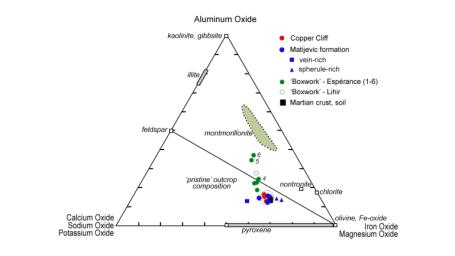
|
Mineral Plot from ‘Esperance’ Target
- Click the image above for a larger view
- Full-Res JPEG (1280 x 720) (61.7 kB)
- Full-Res TIFF (1280 x 720) (2.8 MB)
Caption:
This plot shows how planetary geologists are narrowing in on the composition of a rock target on Mars, known as "Esperance," located in a fracture that cuts through the Matijevic formation on the "Matijevic Hill" region on the western rim of Endeavour Crater. The plot segregates various minerals examined by NASA's Mars Exploration Rover Opportunity according to their different compositions; for example, those with more iron and magnesium oxides are located in the lower right corner.
Opportunity's examination of the Esperance rock used the rover's rock abrasion tool to sequentially grind deeper and deeper into the target, with intervening compositional measurements. The measured samples are closest on this plot to a known mineral called montmorillonite, which belongs to the smectite clay family. Montmorillonite has more aluminum than other clays. Its presence indicates that substantial groundwater flowed through the fracture and was only mildy acidic as well as reducing, meaning the mineral donates electrons to other chemicals.
Cataloging Keywords:
| Name | Value | Additional Values |
|---|---|---|
| Target | Mars | |
| System | ||
| Target Type | Planet | |
| Mission | Mars Exploration Rover (MER) | |
| Instrument Host | Opportunity (MER-B) | |
| Host Type | Rover | |
| Instrument | ||
| Detector | ||
| Extra Keywords | Color, Crater, Water | |
| Acquisition Date | ||
| Release Date | 2014-01-23 | |
| Date in Caption | ||
| Image Credit | NASA/JPL-Caltech/Washington Univ. in St. Louis | |
| Source | photojournal.jpl.nasa.gov/catalog/PIA17757 | |
| Identifier | PIA17757 | |
